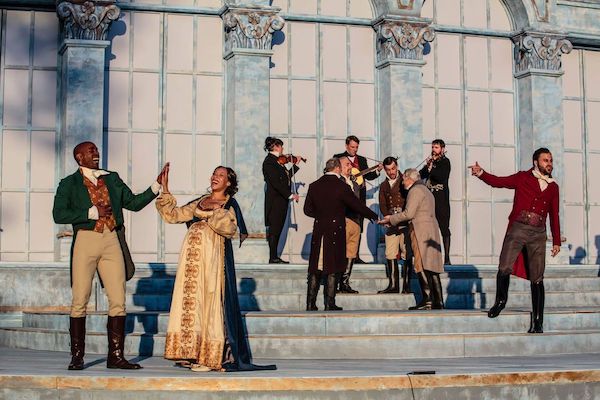
'The Winter's Tale' proves a happy ending often takes a twisted path to its destination
By Tina Farmer
The Shakespeare Festival St. Louis brings one of the Bard's lesser-known works to life with its thoroughly enchanting production of The Winter's Tale. The story cautions against the perils of misplaced jealousy and distrust through King Leontes, a good man who suffers a very ill timed and misguided lapse in judgment. Despite his best efforts, all hope is not lost. After the king learns his lesson, friends, family, and couples are reunited and much happiness ensues. The show is a tricky pastiche, neither a tragedy nor a full-on romantic comedy, but the company's execution is near flawless and engaging.
Charles Pasternak excels in his role as Leontes, giving the king an essential goodness that makes it even easier to put one's self in his shoes. His voice is clear and resonant, his diction crisp and precise, and his characterizations expressive and broad, but never exaggerated or contrived. These distinctions are important because he's playing outdoors to a large audience, with many likely much less familiar with this play than other Shakespearian works. Pasternak commands and artfully holds attention. He's capably complemented by the rest of the cast, ensuring the play's transitions of time, place, and social standing are clearly distinguished then deftly and smoothly filling their characters with life.
Cherie Corinne Rice is almost ethereal as Hermione, the queen beyond reproach. She glides across the stage, her costume reflecting the light and giving her a radiance that's seconded by her warm, persuasive voice. Chauncy Thomas is by turns deferential, concerned, confused, angry, resolute, and reconciled as Leontes's longtime friend Polixenes. He moves as if directed by astute perception, his fealty to the king mirrored in more subtle ways by other members of the court. His son Florizel, played with stubborn charm by Pete Winfrey, is young, brash, and deeply in love with Perdita, a shepherdess who's actually the daughter of Leontes and Hermione. Though her parentage is unknown, Cassia Thompson effortlessly conveys the girl's innate royalty and an ability to capture attention and admiration.
As Paulina, Hermione's most trusted handmaid, Rachel Christopher is flat out fierce. Paulina is as clever and articulate as she is loyal, and even the king knows to be careful not to cross her. Christopher grabs the character's strength and integrity and makes its presence known. The large ensemble cast also features Myke Andrews, Carter Eiseman, Gary Glasgow, Anderson Matthews, Andrew Oppmann, Delaney Marie Piggins, Antonio L. Rodriguez, Whit Reichert, Emma Tiemann, Jerry Vogel, and Sigrid Wise in small but memorable roles that add color and interest to the play.
The Winter's Tale moves at a very quick pace, with humorous scenes featuring popular music leading into each act. The device is a smart choice by director Bruce Longworth, providing necessary exposition and introducing the story to audience members. The scenes are also a lot of fun, providing energetic starts to each act while enabling the relaxed crowd time to get settled in for the main show. Another choice that works well within the context of the play is the incorporation of musicians Matt Pace, Brien Seyle, and Emma Tiemann into the story. Pace and Seyle's original music neatly fills the transitions and directs the emotional tone of the play with a traditional, folk dance bounce that feels true to the time and story.
The production accoutrements are, as usual, expertly and pleasingly designed for the large outdoor theater in Shakespeare Glen. Scott C. Neale's striking set design is glittering and eye-catching in every light, both natural and projected, but still easily transforms just enough to indicate a change of location. The set is enhanced by John Wylie's dreamlike lighting design, Rusty Wandall's cleverly connected sound design, and Dottie Marshall Englis's costumes, which move with the actors beautifully and reinforce period. The cumulative effect is a show that plays out clearly and looks, moves, and sounds lively and interesting even if Elizabethan English isn't instantly familiar to your ear.
Shakespeare Festival St. Louis solidifies its position among the rising Shakespeare festivals in the nation with a perceptive interpretation of The Winter's Tale, running through June 25, 2017. Though the plot dangles ideas of magic and morality, the themes it addresses are down-to-earth relatable and Longworth, the cast, musicians, and crew weave together a satisfying tale. The play emphasizes the foibles and inconsistencies of even the most powerful while providing a path to redemption, an uplifting conclusion to the company's vibrant and richly layered production.


